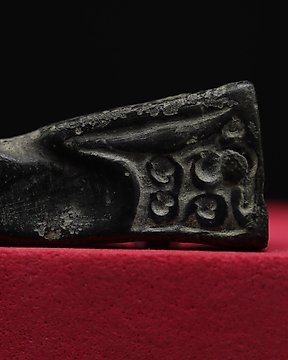
Romain (républicain) - Terminal de ceinture en crocodile en bronze - Relique - 4.3 cm (Sans Prix de Réserve)
Nº 83745627

Nº 83745627

Approximately 1st C BC - Roman Republic - Southern Europe
Dimensions: 1.1 x 1.1 x 1.0 cm
Material: Lead
Object: Roman Gambling Dice
Condition: Excellent condition
We guarantee originality.
Gambling with dice was a popular form of entertainment and pastime in ancient Rome. Dice games were enjoyed by people from various social classes and backgrounds, and they were played for both leisure and as a form of betting. Here's some information about Roman gambling dice:
Materials and Construction: Roman gambling dice were typically made from various materials, including bone, ivory, wood, and occasionally precious metals like bronze. They were small, cubical objects with numbered sides.
Dice Games: There were numerous dice games played in ancient Rome, each with its own rules and variations. Some of these games involved simple rolling and counting of dice, while others had more complex betting and strategic elements.
Tesserae and Calculi: The Roman term for dice was "tesserae," and dice players were referred to as "aleatores." The game itself was known as "alea." Roman dice games were often associated with other forms of gambling, such as betting on races or gladiatorial contests. "Calculi" were small stones or markers used for keeping score or tracking bets.
Popularity and Social Aspects: Dice games were enjoyed by people of various social classes, from commoners to aristocrats. They were played in various settings, including taverns, public spaces, and private homes. The social aspect of dice games was important, as they provided an opportunity for socializing and interaction.
Regulation and Legal Status: The popularity of gambling led to some concerns among Roman authorities. While gambling was not illegal, it was sometimes regulated to prevent excessive gambling and financial ruin. Emperors and local officials occasionally enacted laws to curb excessive gambling.
Dice Symbols: Roman dice typically had symbols rather than numbers. The standard arrangement of symbols on Roman dice was 1-3-4-6, with opposite sides totaling seven. Different games used different combinations of symbols, allowing for a variety of possible outcomes.
Archaeological Discoveries: Archaeological excavations have uncovered Roman dice at various sites across the former Roman Empire. These artifacts provide physical evidence of the games and pastimes enjoyed by ancient Romans.
Legacy: The tradition of dice games and gambling has continued through the centuries, evolving into modern forms of gaming and entertainment.
Roman gambling dice offer insights into the recreational and social aspects of everyday life in ancient Rome. They provide a glimpse into the leisure activities of people from different walks of life and serve as a reminder of the universality of games and gambling throughout human history.
Provenance: Property of a private collector from southern Germany, formed in the 1970s - 1980s.
The Seller can prove that the lot was obtained legally.
Important information. The seller guarantees that he is entitled to ship this lot.
The seller will take care that any necessary permits will be arranged.
The seller will inform the buyer about this if this takes more than a few days.
Comment acheter sur Catawiki ?
1. Découvrez des objets d’exception
2. Faites la meilleure offre
3. Effectuez un paiement sécurisé